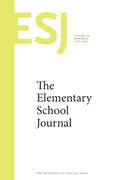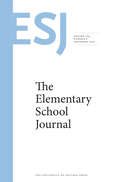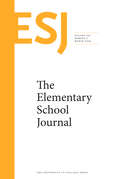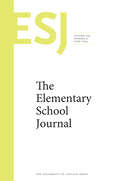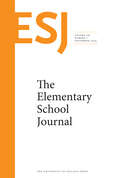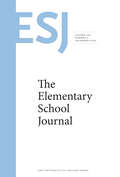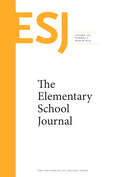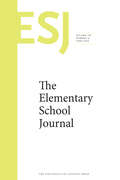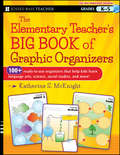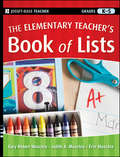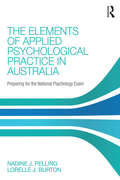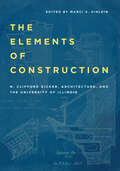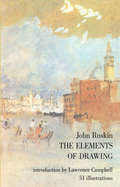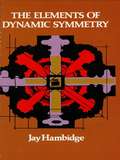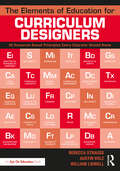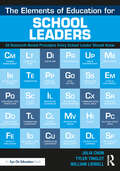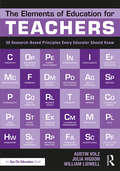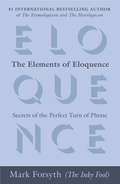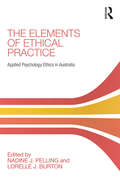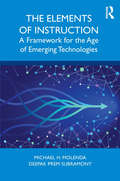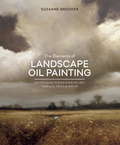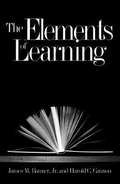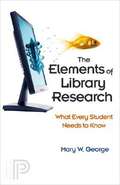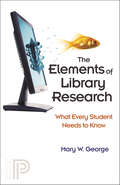- Table View
- List View
The Elementary School Journal, volume 123 number 4 (June 2023)
by The Elementary School JournalThis is volume 123 issue 4 of The Elementary School Journal. The Elementary School Journal (ESJ) has served researchers, teacher educators, and practitioners in the elementary and middle school education for more than one hundred years. ESJ publishes peer-reviewed articles that pertain to both education theory and research and their implications for teaching practice. In addition, ESJ presents articles that relate the latest research in child development, cognitive psychology, and sociology to school learning and teaching.
The Elementary School Journal, volume 124 number 1 (September 2023)
by The Elementary School JournalThis is volume 124 issue 1 of The Elementary School Journal. The Elementary School Journal (ESJ) has served researchers, teacher educators, and practitioners in the elementary and middle school education for more than one hundred years. ESJ publishes peer-reviewed articles that pertain to both education theory and research and their implications for teaching practice. In addition, ESJ presents articles that relate the latest research in child development, cognitive psychology, and sociology to school learning and teaching.
The Elementary School Journal, volume 124 number 2 (December 2023)
by The Elementary School JournalThis is volume 124 issue 2 of The Elementary School Journal. The Elementary School Journal (ESJ) has served researchers, teacher educators, and practitioners in the elementary and middle school education for more than one hundred years. ESJ publishes peer-reviewed articles that pertain to both education theory and research and their implications for teaching practice. In addition, ESJ presents articles that relate the latest research in child development, cognitive psychology, and sociology to school learning and teaching.
The Elementary School Journal, volume 124 number 3 (March 2024)
by The Elementary School JournalThis is volume 124 issue 3 of The Elementary School Journal. The Elementary School Journal (ESJ) has served researchers, teacher educators, and practitioners in the elementary and middle school education for more than one hundred years. ESJ publishes peer-reviewed articles that pertain to both education theory and research and their implications for teaching practice. In addition, ESJ presents articles that relate the latest research in child development, cognitive psychology, and sociology to school learning and teaching.
The Elementary School Journal, volume 124 number 4 (June 2024)
by The Elementary School JournalThis is volume 124 issue 4 of The Elementary School Journal. The Elementary School Journal (ESJ) has served researchers, teacher educators, and practitioners in the elementary and middle school education for more than one hundred years. ESJ publishes peer-reviewed articles that pertain to both education theory and research and their implications for teaching practice. In addition, ESJ presents articles that relate the latest research in child development, cognitive psychology, and sociology to school learning and teaching.
The Elementary School Journal, volume 125 number 1 (September 2024)
by The Elementary School JournalThis is volume 125 issue 1 of The Elementary School Journal. The Elementary School Journal (ESJ) has served researchers, teacher educators, and practitioners in the elementary and middle school education for more than one hundred years. ESJ publishes peer-reviewed articles that pertain to both education theory and research and their implications for teaching practice. In addition, ESJ presents articles that relate the latest research in child development, cognitive psychology, and sociology to school learning and teaching.
The Elementary School Journal, volume 125 number 2 (December 2024)
by The Elementary School JournalThis is volume 125 issue 2 of The Elementary School Journal. The Elementary School Journal (ESJ) has served researchers, teacher educators, and practitioners in the elementary and middle school education for more than one hundred years. ESJ publishes peer-reviewed articles that pertain to both education theory and research and their implications for teaching practice. In addition, ESJ presents articles that relate the latest research in child development, cognitive psychology, and sociology to school learning and teaching.
The Elementary School Journal, volume 125 number 3 (March 2025)
by The Elementary School JournalThis is volume 125 issue 3 of The Elementary School Journal. The Elementary School Journal (ESJ) has served researchers, teacher educators, and practitioners in the elementary and middle school education for more than one hundred years. ESJ publishes peer-reviewed articles that pertain to both education theory and research and their implications for teaching practice. In addition, ESJ presents articles that relate the latest research in child development, cognitive psychology, and sociology to school learning and teaching.
The Elementary School Journal, volume 125 number 4 (June 2025)
by The Elementary School JournalThis is volume 125 issue 4 of The Elementary School Journal. The Elementary School Journal (ESJ) has served researchers, teacher educators, and practitioners in the elementary and middle school education for more than one hundred years. ESJ publishes peer-reviewed articles that pertain to both education theory and research and their implications for teaching practice. In addition, ESJ presents articles that relate the latest research in child development, cognitive psychology, and sociology to school learning and teaching.
The Elementary Teacher's Big Book of Graphic Organizers, K-5
by Katherine S. Mcknight100 ready-to-use graphic organizers that help elementary students learnGraphic organizers are a powerful metacognitive teaching and learning tool and this book features 100 graphic organizers for teachers in grades K-5--double the number of any other book on the market. These graphic organizers can be used as before learning, during learning, or after learning activities, and support students' learning in the major content areas: English language arts, science, social studies, and mathematics. Teachers can use each graphic organizer as-is or customize for their own classroom's unique needs. Tips for classroom implementation and information on how the tool supports learningA Difficulty Dial that indicates the complexity of each graphic organizerTwo Student Samples demonstrating how the organizer may be used with younger and older studentsThis book gives teachers in grades K-5 a powerful way to help students understand relationships between facts, terms, and ideas.
The Elementary Teacher's Book of Lists
by Gary Robert MuschlaAn essential reference for all elementary teachers This comprehensive resource contains useful lists on all the subjects elementary teachers need, from core content to tips on classroom management to advice for students on study skills. The lists highlight vital areas of interest including reading, writing, mathematics, science, social studies, developing social skills, developing effective study skills, and working with an inclusive classroom. 350 reproducible lists on a wealth of subjects of interest to elementary teachers Advice for setting up the classroom, interacting with parents, and making classroom modifications Tips for use with students on studying for tests, organizing homework, and taking good notes All the lists are correlated to national content standards and will be helpful as quick study aids as well as for general reference.
The Elements of Applied Psychological Practice in Australia: Preparing for the National Psychology Examination
by Nadine Pelling Lorelle BurtonThe Elements of Applied Psychological Practice in Australia is a comprehensive and applied review of material required for basic psychological practice in Australia. This book is the first of its kind to offer a one-step resource to success in the Australian National Psychology Examination. Nadine Pelling and Lorelle Burton have provided you with everything you need and more, most notably: • A comprehensive review of applied areas and all assessments noted as important by the Psychology Board of Australia • Study skills and tips, including ‘making a study plan’ and how to manage your time • 100 sample Multiple Choice Questions (MCQ) with answers and explanations. For anyone looking to take the Australian National Psychology Examination, this detailed, concise, and extremely easy to read book is an absolute must-have. Beginning-level and experienced psychologists will also find the comprehensive coverage of applied practice areas a useful reference for their client-related work, and its value as a resource comes alive with its succinct presentation of client-based psychological assessment and the ethics of applied practice and interventions. This book will also be of interest to teachers of psychology and international psychologists and scholars who may be interested in how psychology is practiced in Australia.
The Elements of Construction: N. Clifford Ricker, Architecture, and the University of Illinois
by N. Clifford RickerA pioneer of architecture education in the United States, N. Clifford Ricker notably taught with an emphasis on construction and shop practice in his teaching. Marci S. Uihlein edits and elaborates on The Elements of Construction, the text on building materials that Ricker wrote and used in his teaching, but never published. The book is a window into the expanding possibilities of the late nineteenth-century, as Ricker continually revised The Elements of Construction to keep up with advances taking place in architecture, materials, and construction technology. In addition to providing the full text, Uihlein and the contributors trace Ricker’s career and delve into his practice of teaching. Subject experts explore specific topics. Thomas Leslie surveys contemporary construction practices in Chicago. Tom F. Peters considers Ricker’s writings in the context of the time while Rachel Will looks at masonry know-how and testing. Donald Friedman examines the teaching of iron and steel construction. An illuminating look at a field and a legacy, The Elements of Construction rediscovers a figure that shaped the teaching of architecture and trained a generation that forever changed Chicago.
The Elements of Drawing: In Three Letters To Beginners (Dover Art Instruction)
by John RuskinCan drawing -- sound, honest representation of the world as the eye sees it, not tricks with the pencil or a few "effects" -- be learned from a book? One of the most gifted draftsmen, who is also one of the greatest art critics and theorists of all time, answers that question with a decided "Yes." He is John Ruskin, the author of this book, a classic in art education as well as a highly effective text for the student and amateur today.The work is in three parts, cast in the form of letters to a student, successively covering "First Practice," "Sketching from Nature," and "Colour and Composition." Starting with the bare fundamentals (what kind of drawing pen to buy; shading a square evenly), and using the extremely practical method of exercises which the student performs from the very first, Ruskin instructs, advises, guides, counsels, and anticipates problems with sensitivity. The exercises become more difficult, developing greater and greater skills until Ruskin feels his reader is ready for watercolors and finally composition, which he treats in detail as to the laws of principality, repetition, continuity, curvature, radiation, contrast, interchange, consistency, and harmony. All along the way, Ruskin explains, in plain, clear language, the artistic and craftsmanlike reasons behind his practical advice -- underlying which, of course, is Ruskin's brilliant philosophy of honest, naturally observed art which has so much affected our aesthetic. Three full-page plates and 48 woodcuts and diagrams (the latter from drawings by the author) show the student what the text describes. An appendix devotes many pages to the art works which may be studied with profit.
The Elements of Dynamic Symmetry (Dover Art Instruction)
by Jay HambidgeIs design intuitive or is it consciously and methodically worked out? Are there basic rules governing design that, when learned, will facilitate the creative process? These questions have been asked by artists, art historians, and art critics throughout the ages.Convinced that design was not purely instinctive, Jay Hambidge (1867-1924) spent much of his life searching for the technical bases of design. He found his answer in dynamic symmetry, one of the most provocative and stimulating theories in art history. Hambidge's study of Greek art convinced him that the secret of the beauty of Greek design was in the conscious use of dynamic symmetry -- the law of natural design based upon the symmetry of growth in man and in plants. But Hambidge, who was not only a theoretician but also a practicing artist, did much more than analyze classical art and its principles of design: he worked out a series of root rectangles that the artist, using the simple mathematics supplied in this book, can easily follow and apply in his own work.Originally published as a series of lessons in Hambidge's magazine, The Diagonal, this engrossing book explains all the basic principles of dynamic symmetry. Part I sets forth the fundamental rectangles with their simple divisions based on the proportioning law found in nature; Part II explains compound rectangles, many of which were taken from or suggested by analysis of objects of Greek art. Whether read for its historical importance in art theory, for its illuminating insights into Greek art, or for its practical value to today's artists and commercial designers, The Elements of Dynamic Symmetry has much to offer anyone who is interested in the principle of design.
The Elements of Education for Curriculum Designers: 50 Research-Based Principles Every Educator Should Know
by Austin Volz William Lidwell Rebecca StraussHow should curriculum designers translate abstract learning outcomes into engaging learning experiences that get results? What is the right balance between depth and breadth or between content and skills? What methods should be used to continuously improve a curriculum over time? To answer these kinds of questions, the authors combined research from cutting-edge fields with their own first-hand experience to carefully curate fifty essential elements that demystify the work of curriculum design. Written for utility, clarity, and practical value, this book provides indispensable professional development for educators working in a wide range of fields—from teachers and school leaders to educational publishers and instructional designers. The elements included are applicable across primary, secondary, and higher education as well as for workforce development programs. The Elements of Education for Curriculum Designers is an invaluable resource for anyone aiming to help others learn more effectively.
The Elements of Education for School Leaders: 50 Research-Based Principles Every School Leader Should Know
by William Lidwell Julia Chun Tyler TingleyWhat skills are needed to ensure success as a school leader today? How do you ensure great teaching and learning is happening in your school? How do you build leadership capacity within your teams? To answer these questions, the authors combined up-to-date research with their own leadership experiences to assemble fifty essential principles that will help school leaders focus on what is most important. This book provides clear, concise, and valuable advice for school leaders and their leadership teams. Each principle is paired with a case study that places each one in a real-life context. The Elements of Education for School Leaders is an essential resource for anyone who wants to lead an effective school.
The Elements of Education for Teachers: 50 Research-Based Principles Every Educator Should Know
by Austin Volz Julia Higdon William LidwellWhat makes some teachers more effective than others? What pedagogies and practices are fads and which are backed with quality evidence? Which teaching strategies give teachers the biggest learning bang for their buck? The authors have surveyed the research literature and carefully curated 50 elements of effective teaching—elements such as direct instruction, executive functions, metacognition, motivation, and scaffolding—to answer such questions and demystify the secrets of master teachers. Designed specifically for clarity and ease of use, this book is perfect for both new and experienced educators. Each element uses a consistent architecture: a simple definition, concise overview of the research, practical Dos and Don’ts for the classroom, and a select quote to inspire reflection. The Elements of Education for Teachers is an essential addition to any teacher’s library and important reading for teachers’ professional development.
The Elements of Eloquence
by Mark ForsythFrom classic poetry to pop lyrics, from Charles Dickens to Dolly Parton, even from Jesus to James Bond, Mark Forsyth explains the secrets that make a phrase--such as "O Captain! My Captain!" or "To be or not to be"--memorable. In his inimitably entertaining and wonderfully witty style, he takes apart famous phrases and shows how you too can write like Shakespeare or quip like Oscar Wilde. Whether you're aiming to achieve literary immortality or just hoping to deliver the perfect one-liner, The Elements of Eloquence proves that you don't need to have anything important to say--you simply need to say it well. In an age unhealthily obsessed with the power of substance, this is a book that highlights the importance of style.
The Elements of Ethical Practice: Applied Psychology Ethics in Australia
by Lorelle J. Burton Nadine J. PellingThe Elements of Ethical Dilemmas: Applied Psychology Ethics in Australia is a comprehensive and applied guide to practising psychology in an ethical and professional manner. This book is designed to assist applicants for general registration as a psychologist successfully navigate one of the eight core competencies for general registration set by the Psychology Board of Australia; specifically ethical, legal, and professional matters. The exploration of ethical dilemmas is a core task for the 4+2 pathway to general registration, while related ethical applications require exploration in the 5+1 and higher education pathways to registration as well. This book will teach readers how to identify, explore, and choose the appropriate professional course of action when confronted by ethical dilemmas in practice. The chapters include personal reflections from expert contributors relating to each of the ethical dilemmas, expertly highlighting clients’ and stakeholders’ circumstances, ethical codes and guidelines, scholarship and research, as well as other key elements in the ethical decision-making process. Especially relevant to those applying to become a registered psychologist in Australia, this book offers invaluable guidance on responding to ethical dilemmas as required by the Psychology Board of Australia in various pathways to general registration.
The Elements of Instruction: A Framework for the Age of Emerging Technologies
by Michael H. Molenda Deepak Prem SubramonyThe Elements of Instruction provides a common vocabulary and conceptual schema of teaching and learning that is fully applicable to all forms of instruction in our digital-centric era. This critical examination of educational technology’s contemporary semantics and constructs fills a major gap in the logical foundations of instruction, with special attention to the patterns of communication among facilitators, learners, and resources. The book proposes a new framework for organizing research and theory, clear concepts and definitions for its basic elements, and a new typology of teaching-learning arrangements to simplify the selection of optimal conditions for a variety of learning goals. As trends in media, technology, and methodology continue to evolve, these historically contextual, back-to-basics pedagogical tools will be invaluable to all instructional designers and educational researchers.
The Elements of Landscape Oil Painting
by Suzanne BrookerA landscape painting guide for oil painters that breaks landscapes down into component elements from nature, and showcases tools and techniques used by classic and modern oil painters for bringing these scenes to life. Landscape painting is one of the most popular subjects for painters working in the medium of oils--from classic masters to contemporary artists. In The Elements of Landscape Oil Painting, established Watson-Guptill author and noted instructor/painter Suzanne Brooker presents the fundamentals necessary for mastering landscape oil painting, breaking landscapes down into component parts: sky, terrain, trees, and water. Each featured element builds off the previous, with additional lessons on the latest brushes, paints, and other tools used by artists. Key methods like observation, rendering, and color mixing are supported by demonstration paintings and samples from a variety of the best landscape oil painters of all time. With The Elements of Landscape Oil Painting, oil painters looking to break into landscape painting or enhance their work will find all the necessary ingredients for success.
The Elements of Learning
by Harold C. Cannon James M. Banner Jr.Both a thoughtful celebration of the learning process and a practical guide to becoming a better student, this engaging and helpful book is designed to help students of all ages attain their full potential for success in any area of study.
The Elements of Library Research
by Mary W. GeorgeTo do solid academic research, college students need to look beyond the computer search engine. This short, practical book introduces students to the important components of the information-seeking process. The Elements of Library Researchgives students a foundation for success in any research assignment, from a freshman paper to a senior thesis. Unlike guides that describe the research process but do not explain its logic, this book focuses entirely on basic concepts, strategies, tools, and tactics for research--in both electronic and print formats. Drawing on decades of experience with undergraduates, reference librarian Mary George arms students with the critical thinking skills and procedures they need to approach any academic project with confidence. Ways to turn a topic into a research question Techniques for effective online searches How to evaluate primary and secondary sources When and how to confer with reference librarians and faculty How to avoid plagiarism Glossary of key terms, from Boolean search to peer review Checklists, timelines, and hints for successful research projects
The Elements of Library Research: What Every Student Needs to Know
by Mary W. GeorgeTo do solid academic research, college students need to look beyond the computer search engine. This short, practical book introduces students to the important components of the information-seeking process. The Elements of Library Research provides a foundation for success in any research assignment, from a freshman paper to a senior thesis. Unlike guides that describe the research process but do not explain its logic, this book focuses entirely on basic concepts, strategies, tools, and tactics for research--in both electronic and print formats. Drawing on decades of experience with undergraduates, reference librarian Mary George arms students with the critical thinking skills and procedures they need to approach any academic project with confidence.Ways to turn a topic into a research question Techniques for effective online searches How to evaluate primary and secondary sources When and how to confer with reference librarians and faculty How to avoid plagiarism Glossary of key terms, from Boolean search to peer review Checklists, timelines, and hints for successful research projects
